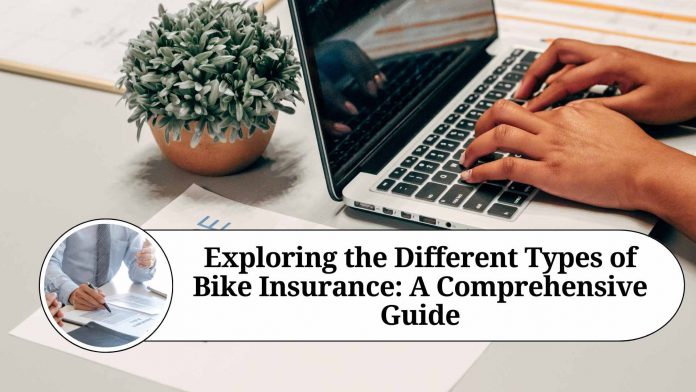Introduction:
Riding a motorcycle is an exhilarating experience, but it also comes with certain risks. To protect yourself and your prized possession from unexpected incidents, having the right bike insurance is essential. However, with various types of bike insurance available in the market, it can be overwhelming to choose the most suitable one. In this blog, we will explore the different types of bike insurance to help you make an informed decision.
- Third-Party Liability Insurance: Third-party liability insurance is the minimum legal requirement in most countries. It covers damages caused to third-party property or injury/death caused to a third party in an accident involving your bike. This type of insurance does not cover damages to your own bike or injuries sustained by you. Third-party liability insurance offers basic coverage and is an affordable option for those on a tight budget.
- Comprehensive Insurance: Comprehensive insurance provides extensive coverage for your bike. It covers damages caused to your bike due to accidents, theft, fire, natural disasters, and vandalism. Additionally, it also includes third-party liability coverage. Comprehensive insurance is highly recommended for individuals who want complete protection for their motorcycle. While it may be more expensive than third-party insurance, the peace of mind it offers is worth the investment.
- Personal Accident Cover: Personal accident cover is an add-on to your bike insurance policy. It provides financial compensation in case of accidental death or permanent disability caused by a bike accident. This cover is especially important as it protects you and your family from the financial burden that may arise due to unforeseen circumstances.
- Medical Expenses Cover: Medical expenses cover is another useful add-on to consider. It takes care of medical expenses incurred by you or your pillion rider in case of an accident. This cover typically includes hospitalization costs, treatment expenses, and ambulance charges. It ensures that you receive the necessary medical attention without worrying about the financial implications.
- Zero Depreciation Cover: When you make a claim for bike damage, the insurance company considers depreciation and deducts a certain percentage from the claim amount. However, with a zero depreciation cover, the insurer will not consider depreciation, and you will receive the full claim amount. This type of cover is beneficial for new bikes and those with expensive spare parts, as it helps in minimizing out-of-pocket expenses during repairs.
- Uninsured/Underinsured Motorist Cover: This cover protects you in case you are involved in an accident with an uninsured or underinsured motorist. If the other party does not have sufficient insurance coverage to pay for damages, this add-on cover will compensate for the losses incurred. It provides an extra layer of protection when dealing with financially irresponsible drivers.
Conclusion:
Having the right bike insurance is crucial for every motorcycle owner. By understanding the various types of insurance available, you can select the one that best suits your needs and provides the necessary protection. Whether it’s the minimum legal requirement of third-party liability insurance or the comprehensive coverage of a comprehensive policy, always remember to assess your requirements, compare quotes from different insurers, and choose wisely. Safeguarding your bike with the right insurance ensures that you can enjoy your rides with peace of mind.
Read more useful content:
Frequently Asked Questions (FAQs)
Q1: What factors should I consider when choosing a bike insurance policy?
A1: When choosing a bike insurance policy, consider factors such as coverage options, premium costs, deductible amounts, claim settlement process, add-on covers, and the reputation of the insurance provider.
Q2: Is it mandatory to have bike insurance?
A2: Yes, in most countries, it is mandatory to have at least third-party liability insurance to legally ride a motorcycle on public roads.
Q3: What does third-party liability insurance cover?
A3: Third-party liability insurance covers damages caused to third-party property or injury/death caused to a third party in an accident involving your bike. It does not cover damages to your own bike or injuries sustained by you.
Q4: Can I get coverage for my bike in case of theft or damage due to natural disasters?
A4: Yes, comprehensive insurance provides coverage for theft, damages due to natural disasters, fire, vandalism, and accidents involving your bike.
Q5: What are add-on covers in bike insurance?
A5: Add-on covers are additional benefits that you can purchase along with your bike insurance policy. These covers provide extra protection and can include personal accident cover, medical expenses cover, zero depreciation cover, and more.
Q6: How is the premium for bike insurance calculated?
A6: The premium for bike insurance is calculated based on various factors, including the make and model of your bike, its age, your location, your age and driving experience, and the coverage options you choose.
Q7: Can I transfer my bike insurance policy to a new owner if I sell my bike?
A7: Yes, bike insurance policies are transferable. You can transfer the insurance policy to the new owner by contacting your insurance provider and following the necessary procedures.
Q8: Can I file a claim for bike damages if I have comprehensive insurance?
A8: Yes, with comprehensive insurance, you can file a claim for bike damages caused by accidents, theft, fire, natural disasters, and vandalism. However, you need to inform your insurance provider immediately and follow their claim settlement process.
Q9: Can I customize my bike insurance policy?
A9: Yes, many insurance providers offer options to customize your policy based on your specific requirements. You can choose add-on covers, increase or decrease coverage limits, and opt for additional benefits as per your needs.
Q10: What is the importance of renewing bike insurance on time?
A10: Renewing bike insurance on time is crucial to ensure continuous coverage. If you fail to renew your policy before its expiration, you may face a lapse in coverage and legal consequences. Additionally, renewing on time also helps maintain the no-claim bonus (NCB) and may qualify you for certain discounts offered by insurers.




















